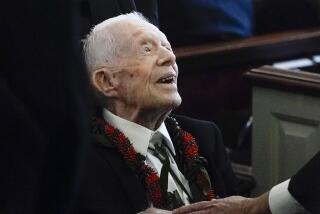Nell Carter, 54; Tony-Winning Singer, Star of ‘Gimme a Break’
Nell Carter, who became a Broadway star in 1978 with her sassy, Tony Award-winning turn in the Fats Waller musical revue “Ain’t Misbehavin,’ ” then extended her fame during the 1980s playing Nell Harper, the black housekeeper who was a surrogate mom to a white police chief’s brood on the NBC sitcom “Gimme a Break,” has died. She was 54.
The singer-actress’ 13-year-old son, Joshua, found her dead Thursday morning in their home in Beverly Hills, according to Carter’s manager, Susan Joseph. The cause of death was uncertain.
Carter spent the last day of her life rehearsing to play Mama in a Long Beach revival of “Raisin,” the 1973 musical adaptation of Lorraine Hansberry’s 1959 drama “A Raisin in the Sun.”
Her character maintains her dignity, resilience and capacity for compassion in the face of hardship and disaster. Carter told a Times reporter who observed rehearsals on Wednesday that she was patterning her performance after the most important and beloved woman in her own life, Edna Lee, the maternal grandmother who raised her.
The actress had to call on reserves of resilience in her own battles with illness, drug addiction and the excess weight she carried on a 4-foot, 11-inch frame. She hoped the role of Mama would return her to Broadway and launch a new career phase as a dramatic leading actress.
Carter grew up in Birmingham, Ala., the fifth of nine children. As a young girl, she began performing in youth singing groups.
But her early years were also filled with trauma: the electrocution of her father, who accidentally stepped on a live power line in a field next to their home when she was a toddler; and her rape at gunpoint when she was 15.
When she was 19, she moved to New York City, singing in coffeehouses. She made her Broadway debut at 22 in “Soon,” a flop that also featured then-unknowns Richard Gere and Peter Allen.
Other early credits included small parts in the stage musical “Jesus Christ Superstar” and the film version of “Hair.” After training in London as a dramatic actress, Carter was cast in “Ain’t Misbehavin,’ ” which ran on Broadway for nearly four years.
Reviewing the show in 1978, John S. Wilson of the New York Times hailed Carter’s “strangely shrill, penetrating voice,” saying it “squeezes out startling rhythmic phrases whether she is lounging ... or bumping and belting.”
In 1988, when Carter and the four other original cast members, including Ken Page and Charlayne Woodard, revived “Ain’t Misbehavin’ ” on Broadway, Frank Rich of the New York Times wrote that Carter’s “voice is the unexpected instrument it always was, an alternately blaring and muted trumpet.... There is a blues lady smoldering beneath the jazz comedienne. Rather than warp the show with her star presence, Ms. Carter deepens it.”
But the actress said the moment of her greatest stage triumph -- the night in 1978 when she won her Tony -- was also the night she first tried cocaine. Along with her television fame in the ‘80s, she recalled in a 1994 People magazine interview, came a drug addiction that was periodically interrupted by treatments instigated only when her friends intervened.
Her other troubles included two divorces, three miscarriages and her grandmother’s long decline from Alzheimer’s disease before dying in 1992. That same year, Carter suffered from a near-fatal brain aneurysm. She later learned she was diabetic, and once, when an insulin shot didn’t kick in, she collapsed on stage while playing the villainous Miss Hannigan in a 1997 Broadway revival of “Annie.”
Carter, always candid about her troubles, stayed busy in recent years with cabaret performances, occasional television guest spots and concerts in which her repertoire ranged from Waller, Gershwin and Duke Ellington to Bob Dylan and country songs.
In the 1990s, she returned to series television with the short-lived “You Take the Kids” and “Hangin’ With Mr. Cooper.”
Film parts included voicing a character in the animated feature “Bebe’s Kids” (1992), and a part in “The Grass Harp” (1995). She took guest spots in “Ally McBeal” and “Reba.”
She also was raising sons Joshua and Daniel, adopted as infants in 1989 and 1990.
“She wanted to show people her many sides, and show that her capability went far beyond being a comic,” said Joseph, Carter’s manager. “She had lost 170 pounds over the last year and was raring to go. This was the year we were going to show her in a different light.”
When she arrived Wednesday at International City Theatre’s Center Theater to rehearse “Raisin,” Carter told co-directors Shashin Desai and caryn desai that she felt as if she were getting the flu. But never mind, Carter said -- she would be there for every rehearsal, every performance, no matter what.
After resting for a moment backstage, she sat down at a table on the stage for an interview in which she was by turns feisty, wry, pointedly critical of certain past shows and showbiz peers and deeply emotional.
Carter choked back tears when talking about her grandmother, and wept as she relived the moment in 1963 when a bomb planted by segregationists went off in a Birmingham church, sending up a cloud of smoke visible from her mother’s front porch as it killed four girls she knew.
She seemed a proud contrarian when she spoke of the Jewish faith she adopted in 1982 “because I believe in the Old Testament,” and about her Republican politics and admiration of President Bush.
Carter remained a woman of girth despite her weight loss, and walked with a limp from past knee injuries. But she carried herself with the mien of a generous aunt.
She passed around the huge diamond set in platinum that she wore on her left-hand ring finger: “I decided after my last divorce to marry myself.” Later, Desai said, she insisted that he wear the ring to a board meeting at the theater.
She joked about her last appearance in Long Beach, a 1991 starring turn in “Hello, Dolly.” “I was the black lady in a white dress who took up half the stage,” Carter said.
And she sang. While pianist Brian Baker played and musical director Darryl Archibald listened, Carter sat in a blue-carpeted lobby overlooking the Long Beach waterfront and the three smoke stacks of the Queen Mary, eyes shut, straddling a chair backward, her body rocking back and forth as she poured out “Measure the Valleys.” Her voice rose from hushed restraint to wailing intensity as she sang Mama’s climactic, anguished cry against life’s injustice, her cry of love and compassion for a son who has just squandered a family’s money and with it a chance for a better life.
When you know how a dream can fade,
How a man comes to be so afraid,
When you know where he’s been, take a look at him again.
Measure the valleys, measure the hills.
She finished and asked Archibald, tentatively, whether he was happy with her performance.
“Very, very, very,” he said. “I wouldn’t ask you to change a thing.”
Desai, artistic director of International City Theatre, said Thursday that he would go on with his production of the rarely staged “Raisin” and dedicate it to Carter’s memory.
“She had very high hopes about this show,” he said. “I’m not going to let it die.”
In addition to her sons Joshua, 13, and Daniel, 12, Carter is survived by a daughter, Tracey of Atlanta.
No funeral arrangements were announced.
More to Read
The biggest entertainment stories
Get our big stories about Hollywood, film, television, music, arts, culture and more right in your inbox as soon as they publish.
You may occasionally receive promotional content from the Los Angeles Times.











